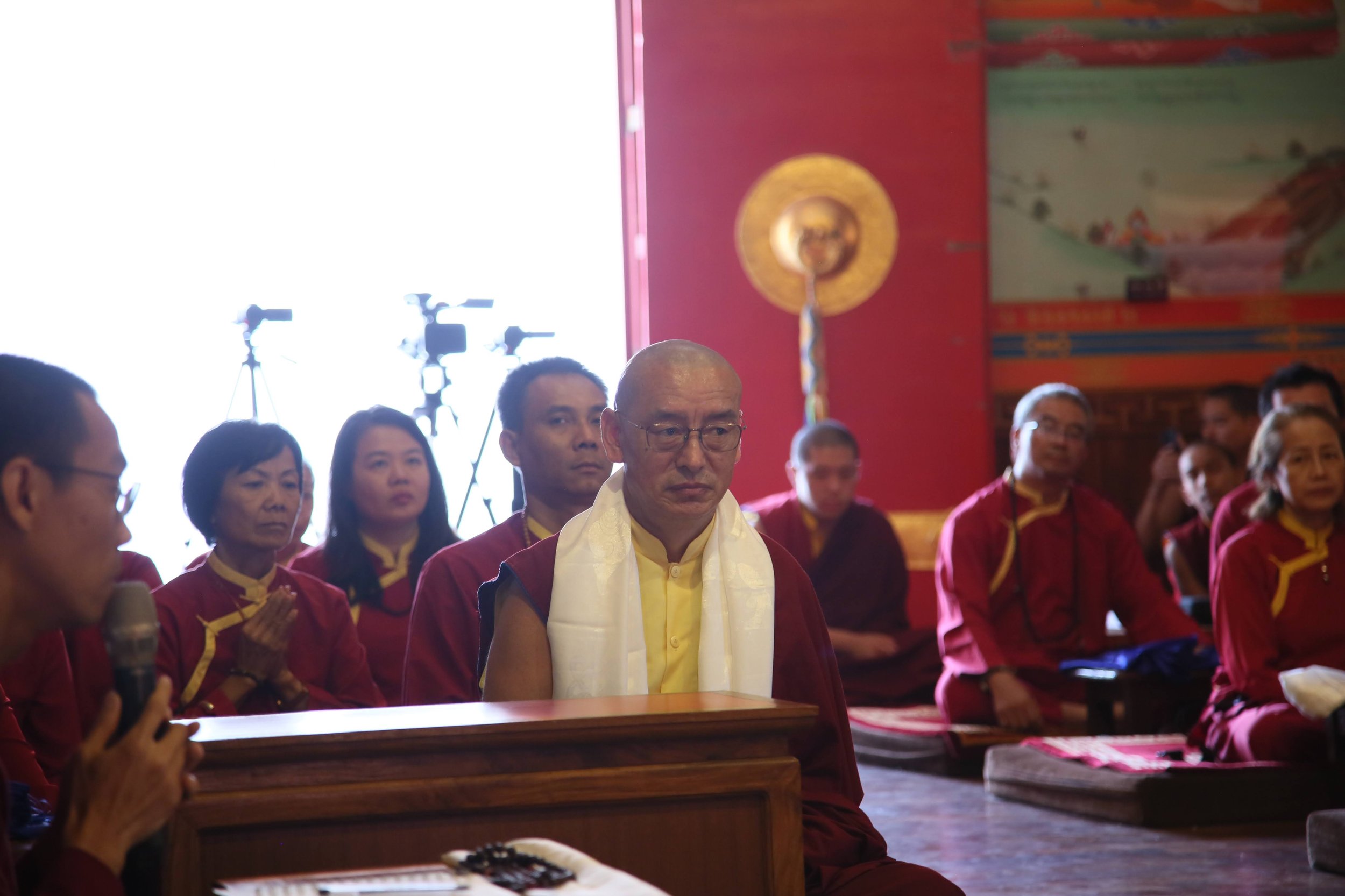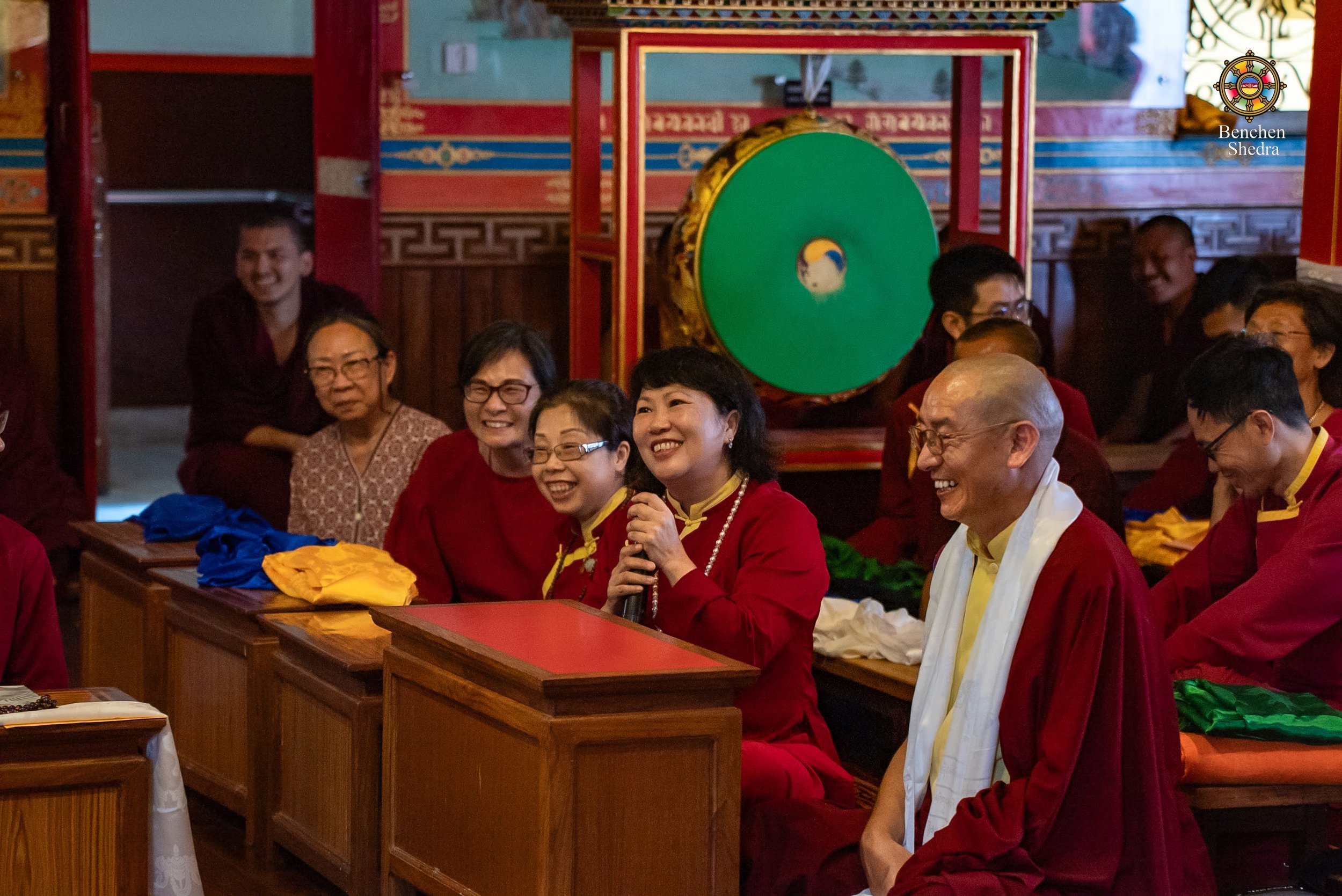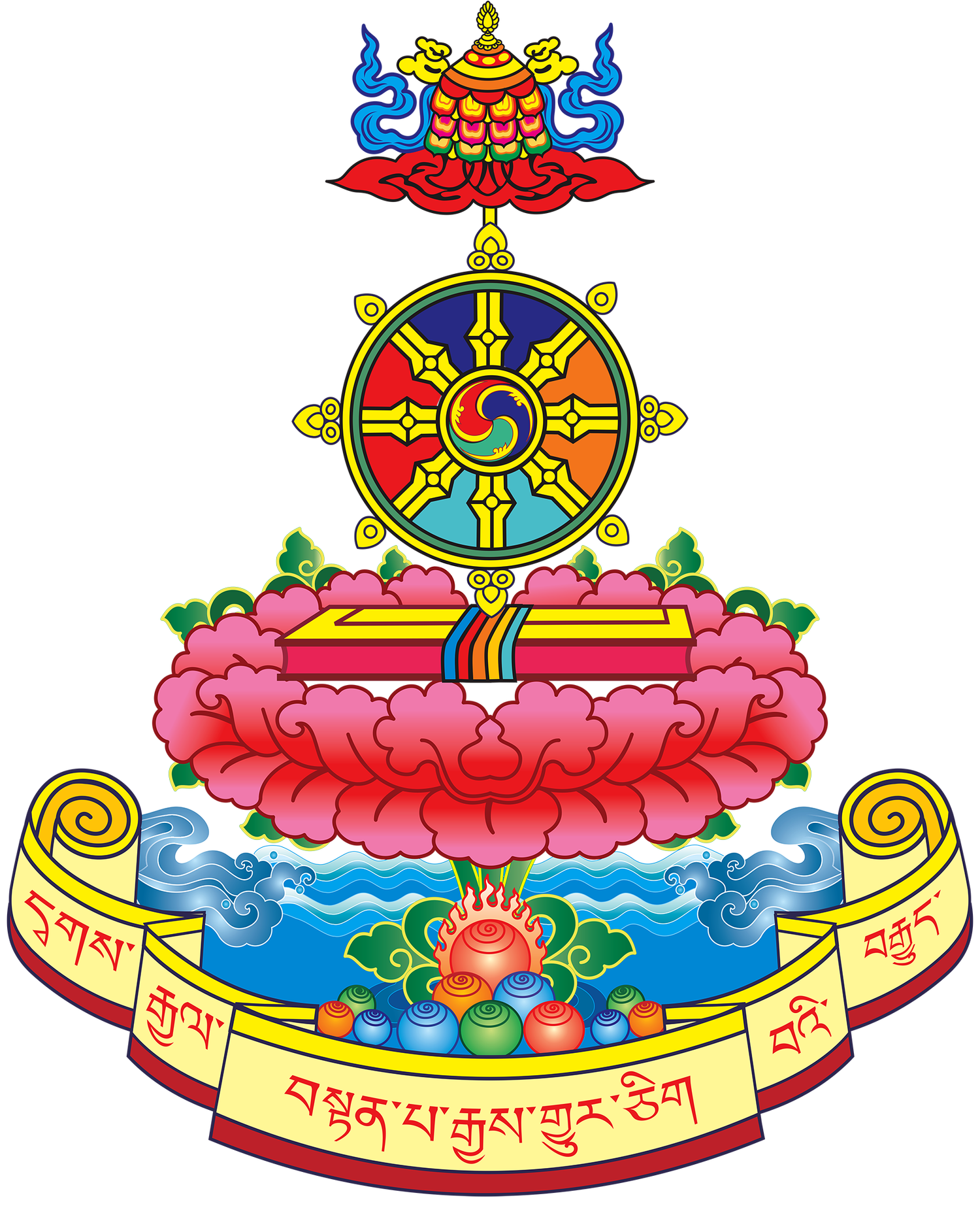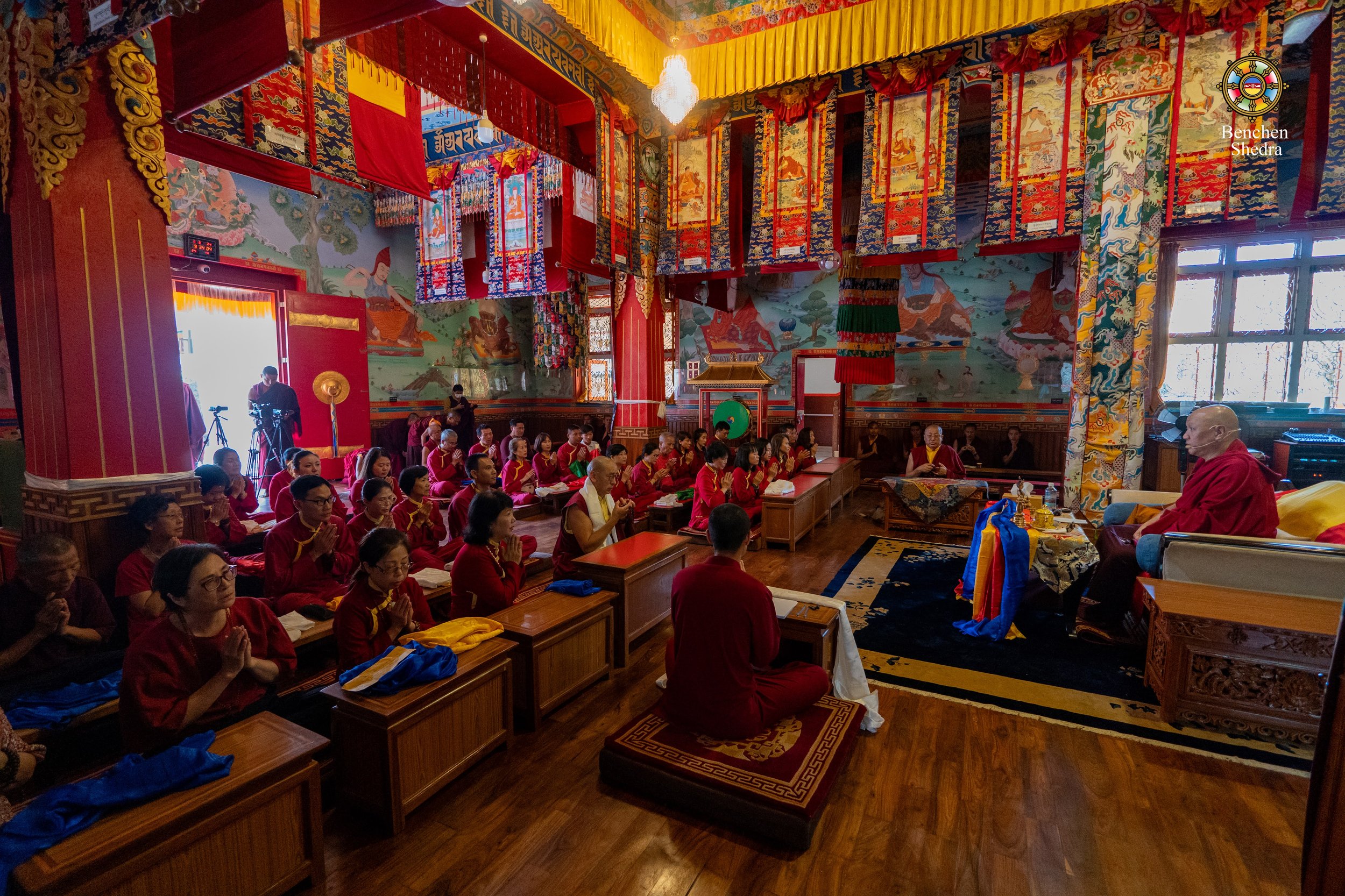H.E Sangye Nyenpa Rinpoche's Timeless Guidances to the Barom Kagyu Disciples from Vietnam, Australia and the US
Oct 10. 2024
Good morning everybody, welcome to our discussion.
He (Sonam Tenzin Rinpoche) did ask me to give the short talk, I haven’t prepared something, the particular topic, but the general talk I will make.
English is not my favorite language but choicelessly, so I will speak English
In general, knowledge of Buddhism, I’m sure you have learned a lot from him (Sonam Tenzin Rinpoche) and other Masters.
When we engage the Buddha Dharma, we engage with three doors: body, speech, and mind. That means we accumulate merit with the body, accumulate merit with the speech, and accumulate merit with the mind.
In the sense of practice of Dharma which means we are trying to bring ourselves into the reality or the reality situation through the training of our body, our speech, and our mind. After all, practice means training, the training of our body, speech, and mind.
Among these three, so-called body – speech – mind. The mind is the most crucial and essential in the sense of training ourself.
What does the train mean? Because we always use “he trains, she trains, they train”, we always repeatedly saying we are traing, we are traing. So what does the training mean?
Our mind is wild, contaminated by all unwanted situations in the sense of obscrurity and unwanted hindrances situation. Therefore, by training our mind we are making change or serious change.
We lost our true identity in the samsara, and we don’t know who we are. This poweful underlying the confusion of the mind and lead us to nowhere. We are wandering and wandering in this Samsara through confusions in the sense of unidentified confusion. I myself don’t know who I am and they don’t know who they are. So now, we are trying to awaken our minds. That is the true training of mind.
After all, cut the long story to short, I’m trying to say here is we are trying to catch ourself rather than to catch others. For that reason, physically engaging in the Dharma is not impotant, verbally engaging in the Dharma is not important. The most important point here is mentally engaging in the Dharma.
If you understand this very important point, when you do prostrations physically, verbally recite or say prayers. All bring into the purpose of training your mind. Otherwise, it’s just a big waste because discipline means you are compulsorily doing something without knowing the reason. You understand the compulsory means no choice. I’m doing this because Master says I must do this and must do that, but you are lack of understanding, so every practice of body and speech is a big waste.
For that reason, when you chant prayers you must understand the purpose of the chanting prayers then you make a meaningful chanting.
As well as when you make a circulation around the stupa, the holy places and the Monastery, you make every movement of your body a meaningful movement. That means, in English term you can use “Awakening Mind”, which means you can understand the reasons, the purposes of.
Whenever you do practice mediation or chant prayers or sit and look at the images of the Buddha, or whaterver you do, it’s up to you but make sure your mind is focusing.
Each of your minds is very simple. Minds are very simple, very clear, very basic and very fundamental if you bring them into awareness, otherwise your mind will be distracted. So there is no Dharma, no spritual practice.
The duration of practice which you do in every section is not important. The importance is bringing your mind into the spiritual practice so that means you sit, you walk, you talk, you eat in everyday life, you engage with the understanding. Then your life is truly and honestly a spiritual life.
You don’t have to be a perfect practitioner. Everytime you watch your mind, your motivation, your mental attitude then the blessing is always there, the blessing of the Buddha, the blessing of the Dharma, the blessing of the Sangha, and these of Dharma protectors. The blessing is there uninterruptedly. If you are not engaging into the blessing, or you don’t experience the vivid there because you meet a huge gap in between. Therefore, it’s your own responsibility not theirs.
We take refuge in the Buddha, we take refuge in the Dharma and we take refugee in the Sangha. What does refuge mean? It means you are seeking a protection, the protection in the sense not for things like sickness or unwanted situation arise from time to time, to prevent them or to avoid them; but a protection your mind from the unwanted situation which is called destruction and powerful confusion.
After all, what you will understand through the Dharma practice, being a perfect Dharma practitioner you must know or you must be aware of what Dharma practice means. The Dharma practice means to deal with all difficult situations, so make sure you can deal with it, you can work with it, and eventually you can get rid of them. Once you get rid of them, you are free.
Just chanting prayers is very simple, very easy and visiting holy places is not difficult, being at monasteries ot stupas or in the practitioner community is not that difficult. Our most difficulty is bring ourselves into the spiritual life. There are so many struggles, so many challenges. Dharma practice is very challenging. To overcome this, there is only one method which is Awakening Your Mind. Buddha mentioned repeatedly in the Sutra and Tantra.
What you understood from my speech? After all, you realize that mind is the most crucial, not the body, not the speech. So we walk with our minds, each and every session you practice mediation or chanting, reading, and contemplating, whatever. Eventually, you come back to the Mind Training.
A very basic term in English “use meditation”, what does mediation mean? Do you understand? One of you may say something for my convenience. Based on that, I will come back to you.
…
Mediation is to look into ourself. It’s quite okay. You are getting close to there, still on the way. Far or near, but still on the way, but it’s okay.
Now I will tell you what meditation means, I’m not a native English speaker, I don’t like this word “mediation”, but we, Tibetan or Dharma term, we call this “gong” which means familiarity.
How to bring myself or ourselves into the mediation. The starting point is very important rather than being into the mediation.
Starting point is finding the mind, because we don’t know what the mind is. I’m quite sure non of us, so far, we cannot clearly define what the mind is. Mind is something which is always within our existence, it is the source and the fundamental of all external phenomena as well as internal phenomena. Phenomenon arises from the mind and dissolve or it goes back to the mind. It’s something very much like characteristic of the reflection.
A very interesting function of this Mind if you carefully define it or you carefully look into.
Very dimensionally functioning the mind is you call Samsara and the opposite of the Samsara is called Nirvana. I said mind is very dimensional. You look at there, look at here, look and the right and the left. It doesn’t matter. Direction, position, any characteristic, it’s very interesting in dimension if you are able to catch this dimensional state of mind. Therefore, how do I catch this dimensional state of mind is just pacifying your mind. Make sure destruction is no longer a disturbance.
Samsara and Nirvana, these two terms or these two different characteristics. We all know what Samsara means and what does Nirvana mean, but our problem is that we always look at something solidly existence of Samsara or Nirvana. That is the wrong starting point of your spiritual practice.
If your mind is not careful that is Samsara. If your mind is very cautious and mindful, that is Nirvana. That is very simple and straightforward.
When I say the starting point which means up to you, how do you look at. The Samsara is something that your mind is disturbed, your mind is no longer in peace, in the harmony, or in the sense of awareness.
Nirvana is called the peaceful mind which means there is no disturbance there, which means the disturbance has been dissolved or transformed. Transform the disturbing emotions or the disturbing phenomena in your own basic, fundamental mind.
You can look, you can hear, you can see, you can taste, you can smell, you can do anything, but the good news is your mind is no longer disturbed. Disturbance arises from grasping your mind at things, you are not satisfied with what you see, what you hear. You cross your line, you try to go further, which means you are trying to cling to it, or you grasp it then all the rest of the confusion arises.
The Samsara is one side of the Mind, the mental reflection. The Nirvana is the other side of the mental reflection. There’s two inherent existences of dual aspects, Samsara and Nirvana.
If you keep trying to grasp two different existences, it’s called the solid dual existences of aspects. If you train your mind, you meditate, then you realize this drill is just a reflection of your habitual tendencies. If you catch your mind, none of them truly exist, and they all dissolve into your own natural mind.
The emotions of fear and hope, fear of Samsara and hope of Nirvana, we are stuck into these two unnecessary situations. To overcome or to get rid of these two existences: You believe that these two things truly exist, so fear arises for the Samsara and hope arises for the Nirvana. Your practices start there.
If you understand clearly and fully, your mind will never be touched or disturbed by any of these two phenomena, Samsara and Nirvana, because they are just reflections of your mental attitude. To understand clearly, you have to meditate, that is the progress of meditation, not only bringing your mind into focusing, it doesn’t work unless you have a mental problem
Mediation means to catch the true nature of your mind. Once you can catch it, they are gone, no disturbance. You don’t need Samsara; you don’t need Nirvana. All is just a reflection of mind. What you need to obtain is the true nature of your mind. From there, you can enjoy life, have a family, do business, or do whatever you like without being disturbed, nothing can disturb you. Therefore, it’s very flexible in the sense of practice, not tightening yourself without understanding, withour a true reason or purpose.
Just complete your mind is zero knowledge then you engage in Dharma is torturing yourself. Mediation means able to catch yourself, understand yourself and understand your mind. From there, you do Dharma practice in a short period, and you make tremendous benefits. There is no need to wait for weeks or months. From there, you say prayers to Buddhas, they can hear you and also you can receive or experience their powerful blessings. If your mind is disturbed, although you say prayers, do mediation or do whatever but they can’t hear you. It doesn’t mean they don’t care about you but the connection is very far. Because of that, making connection towards the Dharma, towards the Buddha, towards the enlightened mind, the spirit master is the one always watch his mind, focus on his motivation and mental attitude. From that, he engages in Dharma practice, then as I said, in just a short period he can really experience the blessings of the Buddhas and Bodhisattvas.
Being a student of (Sonam Tenzin Rinpoche), you should ask him Dharma questions. This is very important, not just saying can you bless me so that I can make a lot of money or good business. I’m sure he can’t do much about that. What he can help you or benefit you is the Dharma practice. In that sense, you have to practice then questions will arise from the practices, then you ask your questions, and he will answer you and make you clear about your practice. With this way, your connection will be called essential Dharma connection. From there you can view him not only as an ordinary individual but also as a spiritual master, who is all in one.
They should apply this unconditionally. Many Asian people as far as I see, they do practice when they face problem. I’m quite sure, when you are sick you say “…” to the medicine Buddha, when you have problem you say, “om Mahakala”, when you are okay you forget, I don’t care, I don’t need you now. When I have a problem, I come back to you. That sort of practice is always a disturbance to you and makes a further and further gap between enlightened beings and yourself.
As I said, spiritual life is like eating, walking, talking, all are free to engage in the Dharma. You are sick or you are not sick, you are happy, or you are unhappy, you are doing well, or you are not doing well. Regardless all these situations, you are always in the Dharma because you are training your mind, you are not doing Dharma practice for the business or for your family life, for your luxury life. It’s something that you understand “Oh, this ego, this disturbingly powerful underlying ego is making me unhappy”. It’s not from external phenomena, it’s something inside which is unseen, you cannot see now, but through the meditation you can see that, therefore you want to get rid of that, so the practice should be continued regardless of what situation you are in.
Q&A
What is the starting point of doing meditation? During the mediation, I will get rid of the fear of Samsara and the hope of Nirvana, so what experience I will get during the meditation?
The staring point means before the meditation you understand the reason or the purpose of meditation. As I said, training of your mind during the mediation, you bring your mind into peace and calm less, but you realize the purpose of mediation ahead of the mediation.
Experience arises by itself; you cannot decorate it. Experience is a natural phenomenon. If you are right into the meditation, the meditation will corporate you the correct experience, you cannot say what experience. If you expect that experience, it is contaminated experience which is never a part of meditation.
After mediation, I feel very loving, if I was angry at my husband I will forget about it and let it go, it’s the same when I had problem in my work
You are doing quite well but you must look for the fundamental because that is just a temporary external factor. When you are angry you do mediation, not bad, but doesn’t mean you are doing very well. It’s good as long as it benefits you, you can continue to do it, but do not make mistake about the purpose of mediation. Mediation is not just for your family life, is not to bring your life into peace but is to bring your fundamental mind to peace. That is the essential purpose of meditation.
Through everyday life, you engage in things and find out the true nature of your mind, and you can increase the speed , from 1 to 2, 2 to 3, 3 to 4 … and so on.
About family life, what I want to say not only meditation but also a true understanding is very important. When you argue with your family members you must tell yourself that you have to be very careful, very cautious with this situation. Unpleasant situations keep coming back one after another, if you are not careful the problem is always there, meditation will never work for you. Making peace through wisdom then with meditation time, in one week or one month, your family will become a perfect family, a peaceful family, and your partner will understand you also. “Oh! She really do good meditation, she was very angry but these days she is very calm”. This is how we deal with the family life situation
Inviting Rinpoche to Australia to give teaching
To be honest I cannot go because my personal teacher is very old, and I’m getting old too. You just continue your practice, that’s okay. You cannot expect something else, someone to go there and wait for him or her to teach the Dharma. That’s quite complicated situation. Dharma is something in everyday life, whatever you hear, whatever you have learned, just put it in your heart, bring it into the life. That is the Dharma. Number of your learning is not important, number of your training is not important, your mind is more important. I’m sure you have heard so many teachings and read Facebook, YouTube, everybody talking there. You can choose I don’t like this, delete; I choose next, okay, listen, it's boring, you can jump here and there. Teaching is not really difficult to make a connection. Our most problem or difficulty is to bring them into the Mind. For example, when Buddha said “Don’t do bad things”, that’s a teaching, and Buddha said “Do the good things” but none of us will do that. Homage to Buddha, You bless me, You are great but have you ever listened to him?
When he says don’t do bad but we do bad things, when he says Do good things but we never do good things. If you don’t train yourself, if you don’t change yourself, if you don’t apply the doctrines of the Buddha then even if hundreds of thousands of teachers come around, it’s useless. So the number of times you meet the Master is not important, the number of time you apply what you have learned to your life is the crucial and the most important. Therefore, going to Australia is not important, if I go to Australia I may not give teaching, what I do is go to coffee shops or go to the beach or go to the mountains. I may say, sorry I come here for holiday not for teaching, then you will be angry again. Situation is very unpredictable, we cannot define what is right and what is wrong, just take it and bring it to the heart. That is the proper way, the practical way and the most healthy way of Dharma practice.
I pray for his longevity and success in Dharma activities. I pray for all of you to be well-being and have good practice and make sure that you can complete your practice in this life, not the next life. Wish you all the best.
When I was meditating to the stage I wondered where my body was, I felt like I had no body at all, what was that phenomenon?
Is it an understanding level, conceptual level, or experiential level? If it is a conceptual level, you should walk forward. Your body is there when you experience “no body”, but in the sense that you say “no body”, you have to understand at the conceptual level, the experiential level or just normal understanding. I don’t want to convince you that it is the right thing, maybe you can mediate more and examine yourself, you can approach the Master and say whether you are doing right or wrong, because meditation is very sensitive. In the sense of experiencing from the mediation, you can feel all kinds of experience, good and bad, empty or not empty, pleasant or unpleasant, all are very natural phenomena that arise so no one can define it as right or wrong unless you go to much deeper level of mediation then the answer arises from itself.
What is difference between a student practicing meditation with and without devotion to the Gurus? Is there a relationship between meditation and devotion?
Devotion is based on wisdom, no wisdom no devotion. Although you claim you have devotion towards a Guru or a Lama but that devotion is unstable, baseless, and can be changed at any moment. With wisdom, true understanding supports your devotion in hand. Therefore, it’s not just a relation but it’s a compulsory to each other that wisdom helps you arise devotion. With that devotion you can catch wisdom, which is an instant ability. It’s beyond the relation because this is the true sense of inseparability, which we need to engage in our spiritual life.
It seems that your question was not clear, not only the differentiation between devotion and wisdom. If there are two persons, one engage in Dharma with a strong devotion and wisdom, the other doesn’t have devotion and wisdom yet but still engage in Dharma, what is the result? It’s obvious that the best is who based on wisdom and motivation. It is the most essential way that we need, but it doesn’t mean that someone cannot engage in Dharma without wisdom and devotion, we still can do, at the starting point we know who is Buddha, who is Dharma, who is Sangha, what is a spiritual life. Without wisdom and devotion, you still can practice but it takes long time.
The choice is yours, but the best choice is with the wisdom, with the devotion you engage in Dharma then in a short time you make a tremendous benefit. The one who engage in Dharma without these two characteristics, it’s not totally wrong, but it takes time to catch the level.
Last question: when I practice, I feel sleepy and everything I hear is muffled, may I ask what state of mental mind which I am in?
It’s too early to discuss it, just be normal, try to meditate, don’t make your mind complicated, get more teachings, get more training of meditation, that’s why I said that meditation is very sensitive, it can lead you to the wrong direction and it can lead you to the right direction, so you have to be very careful. Each and every experience arises from your mediation, you don’t depend on it, just let it come and let it go, but continue






























